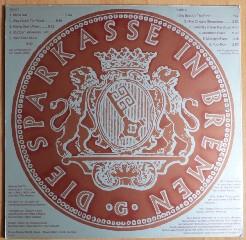Bukka White - Sparkasse In Concert (1975)
Bukka White - Sparkasse In Concert (1975)

A1 Black Rat 5:44 A2 Way Out In The West 5:16 A3 Mama Don't Allow 5:22 A4 Stuttgart, Arkansas 5:45 A5 Don't Fuzz Blues 2:39 B1 Big Boat Up The River 7:47 B2 New Orleans Streamline 3:53 B3 Everyday I Have The Blues 4:40 B4 Aberdeen Blues 2:38 B5 Midnight Blues 4:15 B6 Poor Boy 2:03 Bukka White - guitar, vocals, composer
Mississippi has been the birthplace of many world famous musicians. Elvis Presley, the King of Rock and Roll, was born in Tupelo. B.B. King, the King of Blues, was born in Clarksdale. Another great Mississippi musician, although perhaps less famous, happens to be the first cousin of B.B. King. This early blues musician, Bukka White, may not have sold as many records, but his music endures to this day.
Born sometime in the early 1900’s, Bukka White was one of the many talented blues musicians of his time. Originally named Booker T. Washington White, Bukka is said to have been born in Houston, Mississippi, on November 12, 1909 (eyeneer.com). However, Arne Brogger, a friend of Bukka’s, recalls Bukka having been born in Aberdeen, Mississippi, in 1902 (Brogger). Another reliable source states that Bukka was born in 1906 (Eley). Although the birth date and birthplace of Bukka White is debatable, his extreme gift for blues is not. One factor that aided in promoting Bukka’s talent was his musically-talented family. His father, John White, a railroad worker and part-time musician, taught Bukka how to play the guitar (blueflamecafe.com). John White was a multi-talented musician, playing the mandolin, piano, drums and saxophone (Evans and Hurley157). Bukka’s mother, Lula White, was the daughter of a preacher and often exposed her children to various hymns (Evans and Hurley 147). At age nine, Bukka received his first guitar and began playing immediately after (Eley). Along with the influences of his family, Bukka’s musical career was influenced by blues artists such as George “Bullet” Williams and Charley Patton (Guinness 4452-4453 and blueflamecafe.com). As a teenager Bukka worked as a field hand, played at many juke joints and parties; and, in 1920, he moved to St. Louis to play in the clubs (blueflamecafe.com and Eley). At age sixteen, Bukka married Jesse Bea and moved back to Houston with a new Stella guitar–a wedding gift from his father. Unfortunately, Bukka’s marriage lasted less than three years because Jesse Bea passed away in 1928 (Evans and Hurley 163).
White’s musical breakthrough came around 1930 when Ralph Lembo, an agent for the Victor recording label, sent White to record some of his songs in Memphis (Eley and Historical Tour). In 1934, White married Susie Simpson, the niece of blues artist George “Bullet” Williams (Evans and Hurley 167). Although newly married, White spent a great deal of time in other places. He “hoboed” in cities such as St. Louis, Cincinnati, Cleveland, Baltimore, New York, and many others. To make a little extra money, White played semi-professional baseball with a group called the Birmingham Black Cats and fought in professional boxing matches (Evans and Hurley 169-171). White was a fierce fighter as well as a fierce guitar player. When talking about how he played a steel guitar, Bukka said, “I play so rough – I stomp ’em – I don’t peddle ’em” (Historical tour).
The year 1937 began a tough, yet memorable period for White. In 1937, White was imprisoned for assault at Parchman Farm, the Mississippi Penitentiary. However, this did not stop White from making music. In September of 1937, White recorded one of his hit songs, “Shake ’em on Down, ” under a contract with Vocalion Records. When White was questioned about his activities at Parchman, he smiled and said, “Well, I mostly played guitar.” White went on to record two more songs for the Library of Congress Archive of Folk songs in 1939 (Evans and Hurley 172-175). Upon his release from prison in 1940, he traveled to Chicago to record for Lester Melrose of Vocalion Records (Evans and Hurley 177-178). In 1942, White settled in Memphis and obtained a legal separation from his wife Susie, leaving her to raise their two children alone (Evans and Hurley186-188).
During the1950’s Bukka’s musical career was fairly dormant. Bukka became a common laborer and worked with Newberry Equipment in Memphis. His job consisted of laying out steel for welders to make tanks for the war (Evans and Hurley189). Fortunately, White was “re-discovered” in 1963 by John Fahey and Ed Dawson, two blues enthusiasts (blueflamecafe.com). In the same year White traveled to California to play for several folklore classes at the University of California at Berkeley (Hurley and Evans 196-197). With several re-recordings, White’s blues career was kicked off once again. In 1967, White toured Europe with the American Folk Blues Festival. The next year he was invited to sing at the Olympic Games in Mexico City (Eley). In 1973, White played with his first cousin, B.B. King, at the New Orleans Heritage Festival. That same year, White was nominated for a Grammy award (Eley and Historical Tour). Another outstanding performance given by Bukka White was at Western Illinois University in Macomb, Illinois. There Bukka played with other musicians such as Muddy Waters and B.B. King (Brogger).
Around 1976, White began to suffer from a series of strokes and his health deteriorated. In 1977, Booker T. Washington White, better known as “Bukka” White, passed away around the age of 65.
Its a long way from the fields of southern Mississippi to the Blues Hall of Fame, but Bukka White has walked the walk and sung the songs. Even though he is not Elvis Presley or B.B. King, Bukka White has contributed greatly to the history of Mississippi music. ---Erin Hazlewood, mswritersandmusicians.com
download (mp3 @320 kbs):
yandex mediafire ulozto gett bayfiles








